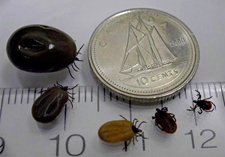Visitor Safety
Staying safe while visiting Grand River Conservation Areas and conservation lands
For more than one million visitors each year, a day or week full of adventure begins at Grand River Conservation Areas. From exploring the ancient geology while camping at Rockwood, to hiking along scenic trails, to splashing the day away at our many beaches, there is something for everyone.
It's important to remember that our conservation areas are natural spaces, and safety should always be top of mind when venturing outdoors. We've compiled some tips and important information you should know before heading out.
Who to call in an emergency
If you find yourself in a serious emergency situation when you are in our conservation areas and conservation lands, dial 911 for immediate assistance.
Stay safe in severe weather
Pay attention to weather alerts and seek shelter in the event of a storm. In severe weather, it is safer to be inside your car or a building than in a tent or outside.
Water and dam safety
Whether you are fishing, boating, paddling, swimming or walking near rivers, and dams and reservoirs, ensure that you and your family members stay water smart and know the risks. Visit both our Safety around dams and Water safety webpages for important information.
Wildlife worries
Grand River Conservation Areas and conservation lands provide habitat for many wild animals. Please understand that you are visiting their home. While in Grand River Conservation Areas, if you have a concern about wildlife or see an animal that seems sick or injured, please let staff know. If you are not in our conservation areas, call the Ministry of Natural Resources and Forestry Information Centre Line at 1-800-667-1940.
West Nile virus
Mosquitos thrive in warm, damp areas and can carry diseases like West Nile virus. This illness primarily affects birds, but if a mosquito happens to feed on the blood of an infected bird, there is the potential for you to get the virus as well. Although most people do not get sick from an infected mosquito, mild or serious symptoms may develop. Help repel mosquitos by using a repellant approved by Health Canada. If you have concerns or questions, contact your local health unit, medical professional, or visit the Government of Ontario's West Nile virus webpage.
Get tick smart

Ticks are a common occurrence in Ontario and can usually be found in wooded or brushy areas or areas with long grass. Blacklegged ticks may carry bacteria that cause Lyme disease, a serious illness. To help minimize your risk of coming in contact with a tick, stay on marked trails, wear long pants and tuck them into your socks, wear close toed shoes, and use a repellant that contains DEET or Icaridin. Contact the local health unit, a medical professional, or check the Government of Ontario and the Public Health Ontario webpages on Lyme disease for more information, including risk area maps.
Giant hogweed and poison ivy
Learn what to do if you spot giant hogweed on GRCA properties. As well, be aware that poison ivy, another noxious weed, grows on GRCA properties and in Grand River Conservation Areas. For information and how to identify poison ivy, check the Ontario Ministry of Agriculture, Food and Rural Affairs website.
Contact Us
Grand River Conservation Authority
400 Clyde Road, PO Box 729
Cambridge, ON
N1R 5W6
Phone: 519-621-2761
Toll Free: 1-866-900-4722
grca@grandriver.ca
